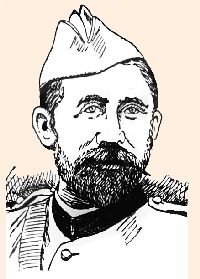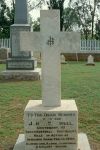Biography – Lieutenant John William Powell
First Mounted Rifles, First Australian Regiment, South Australian Contingent
John William Powell, the eldest son of John and Lucy Powell, was born at Mount Gambier, South Australia, on 12 August 1862. After his father’s death in 1893 he took over the family farm. A single man, he joined 'D' Company Infantry in 1886 and worked his way up to the rank of Lieutenant, receiving his commission in 1897.1
Powell enlisted and embarked at Port Adelaide on the transport Medic, on 2 Nov 1899, arriving in Cape Town on 25 November. The First Australian Regiment was formed at Cape Town on 26 November, 1899 by the amalgamation of the companies sent to South Africa from Victoria, South Australia, Western Australia and Tasmania under the command of Colonel J C Hoad, Victoria. The unit was in Naauwpoort about the end of January; then went to Rensberg, and then to Maeder's Farm, where they were supplied with horses, and converted into Mounted Infantry. In the fighting which took place at Hopkirk's Farm Lieutenant Powell was killed on 9 February 1900.2
Powell was the first South Australian to be killed in South Africa. He was described as alert, intelligent, and painstaking in the discharge of his duties and a thoroughly efficient officer.3 When news of his death reached Mount Gambier:
Flags were flown half-mast over business houses and at the Rechabite Hall, of which lodge Lieutenant Powell was a member, the black flag floated sadly in the breeze. A similar flag was flying at the Oddfellows' Hall.4
An impressive memorial service was held in the Institute Hall in Mount Gambier. It was attended by a broad section of the community including thirty members the Mounted Rifles, sixty from the Infantry, upwards of ninety-six Oddfellows and about thirty members of the Morning Star Tent of the Rechabite lodge, who assembled at Christ Church and marched to the hall. All who took part in the procession wore mourning sashes or badges. Crowds lined the streets and many were unable to gain admission to the hall for the service. The Venerable Archdeacon Young delivered an eloquent and powerful address. The service closed with the playing of 'Go bury thy sorrow', after which the troops marched up and down Commercial Street.5
Another memorial service, at the church, which John Powell had attended, featured members of 'D' Company, 2nd Battalion. They met at the Military Hall and marched to Christ Church of England, wearing black armbands as a mark of respect. Several other churches in Mount Gambier and Kingston made reference to his death, singing funeral hymns, with military bands playing the Dead March in Saul.
The South Australian Government decided that in Powell's honour the name of the new settlement under the Closer Settlement Act, on the banks of the Torrens River, should be altered from Klemzig to Powell.6
The return of Lieutenant Powell's remains to Mount Gambier was also considered. As he was the first South Australian to fall on a battlefield it was thought appropriate to return his body to his hometown for burial under a suitable monument.7 Initially, John Powell was buried at Hopkirk's Farm where he died but his remains were later moved to the Colesberg Garden of Remembrance.
1 Death of Lieutenant J Powell-Killed in Action, etc, The South-Eastern Star, 20 February 1900.
2 Official records of the Australian Military Contingents in the War in South Africa, Col P L Murray, Melbourne, 1911. Murray gives Powell's place of death as Hopkirk's Farm (p343) and Rensberg (p344).
3 Lieutenant Powell, The Express & Telegraph, 17 February 1900.
4 Death of Lieutenant J Powell-Killed in Action, etc, The South-Eastern Star, 20 February 1900.
5 The Late Lieut. J Powell – Memorial Service at the Institute etc., The South-Eastern Star, 27 February 1900.
6 Honouring a Dead Soldier, Argus, 26 May 1900.
7 A Valuable Suggestion, The South-Eastern Star, 23 February 1900.




